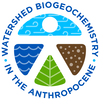Welcome to the Watershed Biogeochemistry in the Anthropocene Lab at Michigan State University led by Dr. Jacqueline Gerson! We are a part of the Department of Earth and Environmental Sciences and Kellogg Biological Station.
Humans have drastically changed the world by introducing contaminants, altering landcover, and changing the climate, ultimately causing us to have entered a new epoch: the Anthropocene. Our group studies how anthropogenic activities have altered the cycling of nutrients and contaminants through watersheds, with a focus on linked biogeochemical cycles within socioenvironmental systems. We examine the fate, transport, and transformation of these elements and compounds within and between terrestrial and aquatic ecosystems. We also evaluate the implications this has for the people and animals that live in these landscapes. The research we conduct does not end with a scientific publication; we are actively engaged in sharing our results with those outside of academia and particularly with those communities impacted by our findings. Our lab uses a variety of interdisciplinary tools to address these questions including fieldwork, labwork, and data syntheses and takes place locally, nationally, and internationally. Read more about our research here.
We are activity recruiting graduate students and postdocs. If you are interested, please check out this page about how to join us and this position description.
Michigan State University occupies the ancestral, traditional, and contemporary Lands of the Anishinaabeg–Three Fires Confederacy of Ojibwe, Odawa, and Potawatomi peoples. The University resides on Land ceded in the 1819 Treaty of Saginaw.
Humans have drastically changed the world by introducing contaminants, altering landcover, and changing the climate, ultimately causing us to have entered a new epoch: the Anthropocene. Our group studies how anthropogenic activities have altered the cycling of nutrients and contaminants through watersheds, with a focus on linked biogeochemical cycles within socioenvironmental systems. We examine the fate, transport, and transformation of these elements and compounds within and between terrestrial and aquatic ecosystems. We also evaluate the implications this has for the people and animals that live in these landscapes. The research we conduct does not end with a scientific publication; we are actively engaged in sharing our results with those outside of academia and particularly with those communities impacted by our findings. Our lab uses a variety of interdisciplinary tools to address these questions including fieldwork, labwork, and data syntheses and takes place locally, nationally, and internationally. Read more about our research here.
We are activity recruiting graduate students and postdocs. If you are interested, please check out this page about how to join us and this position description.
Michigan State University occupies the ancestral, traditional, and contemporary Lands of the Anishinaabeg–Three Fires Confederacy of Ojibwe, Odawa, and Potawatomi peoples. The University resides on Land ceded in the 1819 Treaty of Saginaw.

